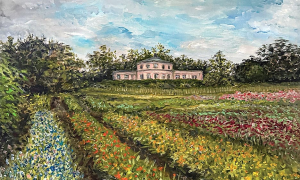Musician and street poet Gil Scott-Heron, best known for “The Revolution Will Not Be Televised," died today. Cause of death was not immediately known; he was 62.
Scott-Heron started out at the dawn of the 1970s as a jazz-inclined R&B singer and spoken-word performer, a rapper years before the genre was formally invented. “The Revolution Will Not Be Televised"—which appeared on Scott-Heron's conversational debut recording, 1970's Small Talk at 125th and Lenox—was so influential that the saying ultimately moved into the language. His Pieces Of A Man from 1971 went even further, successfully merging tough inner-city imagery and jazzy soul into an artistic triumph.
He'd eventually put forth a telling lyric, though: “Met a woman in a bar, told her I was hard to get to know and near impossible to forget." It was an apt description for a stop-start career that saw Scott-Heron occasionally disappear for lengthy stretches of time.
For instance, he recorded extensively into the 1980s—a stint that included his well-regarded mid-70s collaborations with composer-keyboardist-flutist Brian Jackson—but then didn't release another album until Spirits in 1994. Along the way, he was also a player in establishing a national holiday to honor Martin Luther King Jr. Scott-Heron went on tour with Stevie Wonder in 1980, and the pair rallied the masses in Washington to support a congressional proposal that would eventually honor the slain Civil Rights leader. By then, his influence had swept through the rap community. “In combining music with the word, from the voice on down," Public Enemy's Chuck D once said, “you follow the template he laid out."
After struggling with substance abuse in the early 2000s, a period that included jail time, Scott-Heron then reemerged again last year—even as his voice was sampled by rapper-producer Kanye West on the platinum-selling album My Beautiful Dark Twisted Fantasy. Scott-Heron's final recording would be a critically acclaimed, ironically titled 2010 project, I'm New Here. Still, maybe that was the right way to introduce himself to an entire generation of listeners who have come of age since his last record.
Scott-Heron, who eventually settled in East Harlem—just across the river from Rikers Island, where he'd spent more than a year—knew just what to do with Robert Johnson's “Me And The Devil": Take it into modern times, stripping the blues completely off and delivering its harrowing power using a still emotionally affecting voice, even edgier now with a deepened rasp. Right after that, he did a one-eighty with the folky title song, delivered with just his voice, now softer, and an acoustic guitar. Everywhere was a clash of the old and the new—in both topics and music/recitations—and the production balanced the two effectively, keeping Scott-Heron's singular talents at the forefront.
At a time when most popular R&B and rap had devolved into dance music—all shake, no sizzle—Scott-Heron, a ground-floor griot, continued to speak truth to power.
Scott-Heron's take on Johnson's “The Devil And Me" would be named Something Else! Reviews' top mainstream song of 2010, recognition for the way his hip-hop version further embellished on the mystique of Johnson and his tunes.
Johnson died young in 1938, but the shadow he casts grows longer with each passing year. His songs—though there were less than 30 of them recorded—have consumed the blues world ever since, with innumerable subsequent covers. It was just a matter of time before those songs found their way into other musical realms. They're just too powerful not to.
Yet this one was special, the kind of interpretive triumph that leaves an indelible impression: Producer Richard Russell put in a plodding, cymbal-crashing, head-nodding groove and spacious, sparse synths way behind it on the Scott-Heron update, creating a spooky, atmospheric march. Scott-Heron's voice had weathered down quite a bit since Pieces Of A Man, but it's that same quality that also made the song so chilling. Scott-Heron, who'd once been called “the black Bob Dylan," spoke with a resurgent authority on lyrics like these:
Early this morning When you knocked Upon my door And I say “Hello Satan" I believe it's time to go
Johnson, of course, was singing of his own life and the time and place he lived in. Leave it to Gil Scott-Heron, even late in his own third act, to bring those tough times—times filled with worry and doubt, but also the first flowerings of resilient hope—rumbling back to life. He was, after all, never very far from those demons.
Scott-Heron started out at the dawn of the 1970s as a jazz-inclined R&B singer and spoken-word performer, a rapper years before the genre was formally invented. “The Revolution Will Not Be Televised"—which appeared on Scott-Heron's conversational debut recording, 1970's Small Talk at 125th and Lenox—was so influential that the saying ultimately moved into the language. His Pieces Of A Man from 1971 went even further, successfully merging tough inner-city imagery and jazzy soul into an artistic triumph.
He'd eventually put forth a telling lyric, though: “Met a woman in a bar, told her I was hard to get to know and near impossible to forget." It was an apt description for a stop-start career that saw Scott-Heron occasionally disappear for lengthy stretches of time.
For instance, he recorded extensively into the 1980s—a stint that included his well-regarded mid-70s collaborations with composer-keyboardist-flutist Brian Jackson—but then didn't release another album until Spirits in 1994. Along the way, he was also a player in establishing a national holiday to honor Martin Luther King Jr. Scott-Heron went on tour with Stevie Wonder in 1980, and the pair rallied the masses in Washington to support a congressional proposal that would eventually honor the slain Civil Rights leader. By then, his influence had swept through the rap community. “In combining music with the word, from the voice on down," Public Enemy's Chuck D once said, “you follow the template he laid out."
After struggling with substance abuse in the early 2000s, a period that included jail time, Scott-Heron then reemerged again last year—even as his voice was sampled by rapper-producer Kanye West on the platinum-selling album My Beautiful Dark Twisted Fantasy. Scott-Heron's final recording would be a critically acclaimed, ironically titled 2010 project, I'm New Here. Still, maybe that was the right way to introduce himself to an entire generation of listeners who have come of age since his last record.
Scott-Heron, who eventually settled in East Harlem—just across the river from Rikers Island, where he'd spent more than a year—knew just what to do with Robert Johnson's “Me And The Devil": Take it into modern times, stripping the blues completely off and delivering its harrowing power using a still emotionally affecting voice, even edgier now with a deepened rasp. Right after that, he did a one-eighty with the folky title song, delivered with just his voice, now softer, and an acoustic guitar. Everywhere was a clash of the old and the new—in both topics and music/recitations—and the production balanced the two effectively, keeping Scott-Heron's singular talents at the forefront.
At a time when most popular R&B and rap had devolved into dance music—all shake, no sizzle—Scott-Heron, a ground-floor griot, continued to speak truth to power.
Scott-Heron's take on Johnson's “The Devil And Me" would be named Something Else! Reviews' top mainstream song of 2010, recognition for the way his hip-hop version further embellished on the mystique of Johnson and his tunes.
Johnson died young in 1938, but the shadow he casts grows longer with each passing year. His songs—though there were less than 30 of them recorded—have consumed the blues world ever since, with innumerable subsequent covers. It was just a matter of time before those songs found their way into other musical realms. They're just too powerful not to.
Yet this one was special, the kind of interpretive triumph that leaves an indelible impression: Producer Richard Russell put in a plodding, cymbal-crashing, head-nodding groove and spacious, sparse synths way behind it on the Scott-Heron update, creating a spooky, atmospheric march. Scott-Heron's voice had weathered down quite a bit since Pieces Of A Man, but it's that same quality that also made the song so chilling. Scott-Heron, who'd once been called “the black Bob Dylan," spoke with a resurgent authority on lyrics like these:
Early this morning When you knocked Upon my door And I say “Hello Satan" I believe it's time to go
Johnson, of course, was singing of his own life and the time and place he lived in. Leave it to Gil Scott-Heron, even late in his own third act, to bring those tough times—times filled with worry and doubt, but also the first flowerings of resilient hope—rumbling back to life. He was, after all, never very far from those demons.


























